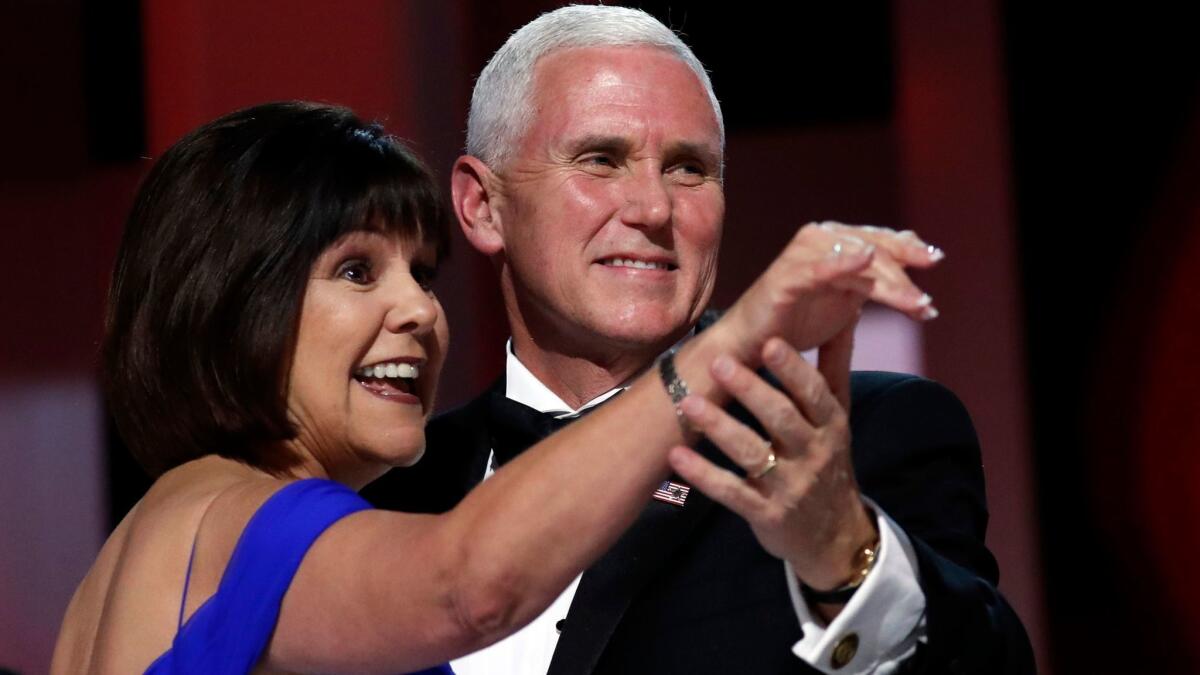California Journal: Mike Pence won’t dine alone with a woman who’s not his wife. Is that sexist?

Last week, the Washington Post profiled second lady Karen Pence, a devout Christian and devoted wife who is, as the story put it, her husband’s “prayer warrior,” “gut check” and “shield.”
Ashley Parker, the reporter, noted that Vice President Mike Pence once had told The Hill, a political newspaper and website, that he never dines with women alone, nor does he attend functions without his wife if alcohol is being served.
This tidbit popped off the page like a spark from a burning log. Twitter, which is always highly combustible, exploded.
Was this a sign of marital devotion and respect? Or a signal that the Pences don’t trust Mike Pence to be alone with a woman? Or perhaps don’t trust a woman to be alone with Mike Pence?
I figured this fusty-seeming practice must spring from the couple’s well-known religiosity.
They were married in the Catholic church, later became evangelical Christians and frequently talk about their faith. Mike Pence often describes himself as “a Christian, a conservative and a Republican, in that order.”
Some people said the vice president simply was following the “Billy Graham rule” — created by the famous evangelist in 1948, when he was on the road proselytizing. Graham and his male colleagues vowed to avoid situations that would “have even the appearance of compromise or suspicion.”
If you don’t go out to dinner with a woman, it’s hard to have a woman be your campaign manager or your chief of staff. I believe this is gender discrimination.
— Kim Elsesser, author of “Sex and the Office: Women, Men and the Sex Partition That’s Dividing the Workplace”
Removing temptation (in the form of women) from men is a staple of many patriarchal faiths. A straight, married man will not be tempted to stray if he does not spend time alone with an unrelated woman. Of course, it won’t stop a man from lusting in his heart. But that’s not the organ we’re worried about, I guess.
There is actually a more important principle at stake here, and one that transcends the Pences’ — or anyone else’s — bond.
In the eyes of the law and the government, women are equal to men. They are deserving of the same workplace opportunities that historically have presented themselves to men.
If professional women and men cannot be alone together, women are the ones who will pay a price. They will not have the kind of mentoring that promotes workplace advancement. They will not develop the same kinds of relationships with bosses that their male colleagues do.
They will lose out.
“I believe this is gender discrimination,” said Kim Elsesser, 52, a UCLA lecturer on gender and psychology who founded a proprietary quantitative hedge fund at Morgan Stanley after graduating from Vassar and MIT. “If you don’t go out to dinner with a woman, it’s hard to have a woman be your campaign manager or your chief of staff or whoever you need to regularly meet with.”
Now, maybe I’m just a garden variety Jezebel. But I, a single woman, often spend time alone with married men in the course of my work.
I buy them coffee. I take them to lunch. Sometimes, temptress that I am, I even drink wine with them at dinner.
Often, when I am downtown, I will beckon a married male colleague into my office. (I have so many to choose from!)
We say nothing until I close the door. We sit down. We look straight into each other’s eyes.
And then we talk about work.
::
In 2015, National Journal conducted an anonymous survey asking women about their experiences as congressional staffers. Were there any advantages to being a woman? Had they ever experienced sexism?
Advantages were mostly superficial, according to the responses. One woman said she was treated better by security guards than her male colleagues. Another said that Republican congressmen seemed to like to have women as spokespeople.
But the disadvantages were stark, particularly when it came to issues like being alone with their male bosses:
- “There is a great deal of favoritism in my office. The women work the hardest and the men get all the benefits, the high-profiled trips with my boss, greater access to the White House and prestigious contacts. It’s a boys club, and the women are rarely invited.”
- “There was an office rule that I couldn’t be alone with the congressman. The rule was to protect him and me, but it still felt unfair.”
- “My former boss never took a closed-door meeting with me in the span of working for him, on and off, over a 12-year stretch. Even when I was in a position of senior leadership. This made sensitive and strategic discussions extremely difficult.”
In her 2016 book “Sex and the Office,” Elsesser coined the phrase “sex partition” to describe this dynamic.
“It’s an artificial barrier between men and women at work,” she said. Male subordinates who can spend time alone with their bosses are going to develop deeper relationships.
“Obviously,” said Elsesser, “when it comes time for promotions, who is going to get them?”
::
While we’ve been engaged in a discussion about whether it’s appropriate for men to avoid being alone with their female colleagues and subordinates, we’ve also been awash in new tales of bad male behavior over at the Fox News Network.
Last weekend, the New York Times published a front-page investigation into harassment allegations against Fox star Bill O’Reilly. It reported that five women had reached settlements totaling $13 million with the network or O’Reilly personally. (At least two of the network’s settlements, the Times reported, were reached after Fox removed longtime Chairman Roger Ailes in the wake of sexual harassment claims by two dozen women.)
“One thing that struck me about these stories were the comments I’ve read, ” Elsesser said. “They say: ‘Women are upset because they are getting sexually harassed, and now they are upset that this guy [Pence] is avoiding interactions with them. You just can’t make them happy.’”
So are men damned if they do and damned if they don’t?
Short answer: No.
Longer answer: Hell, no. Women want to be treated as workplace equals, and they don’t want to be sexually harassed. If you are a man and this strikes you as unfair, ambiguous or damning, perhaps you don’t belong in the workplace at all.
Twitter: @AbcarianLAT
ALSO
Editorial: Our dishonest president | Part I in a series
Pay gap between men and women in California is nearly $79 billion a year
More to Read
Start your day right
Sign up for Essential California for news, features and recommendations from the L.A. Times and beyond in your inbox six days a week.
You may occasionally receive promotional content from the Los Angeles Times.






